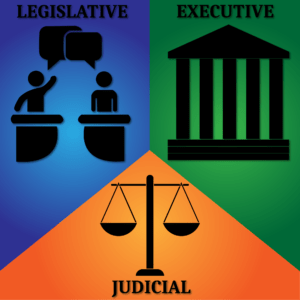There are three sections of power in a state. They are called the three branches of government. The separation of power is crucial to maintain a democratic form of government. In a democracy, one branch cannot control absolute power. Thus, a small group cannot rule on their own.
These three branches are called legislative, executive, and judicial. While the first two may be more interconnected, the third, judicial, must be as independent as possible. It is a necessary form of checks and balances in a state. Additionally, it is a component of the rule of law.
The French political scientist Charles Louis Montesquieu first described this three-way separation of powers in 1748. But, there were other systems in history. The separation of power is a fundamental part of the parliamentary, presidential, and semi-presidential system.

Legislative Power
The legislative branch has the power to make laws. The cornerstone of their work should always be to serve the people. Hence, they must ensure that their laws do so. It has the right to appoint specific figures into office. Further, this branch is responsible for holding the executives accountable.
Citizens elect the legislators through elections. In general, you can find a single or multi-house system, for example, a house of representatives or assembly and a senate. Together, the two houses form a parliament.
Executive Power
The primary goal of the executives is to enforce the law. Hence, they administrate the state through a series of offices and organizations. However, they also have the mandate to issue some orders.
The central figures of the executives are the head of state and the head of government. Based on the system, this can be one person or two. Further, the government makes up ministers that control given areas (the armed forces, healthcare, finances, and so on). Lastly, the executive branch is held accountable by the legislative power. They gain confidence through the parliament.
Judicial Power
The judicial power is a system of independent courts. The primary function is to interpret the law. And secondly, to apply the law in court. There are two options, a dispute between two citizens or between the state and a citizen. Hence, it decides on guilt and punishment.
Another crucial function of judicial power is to control the executive and legislative power. It can declare laws or orders unconstitutional. That is the authority of a Constitutional or Supreme court.
